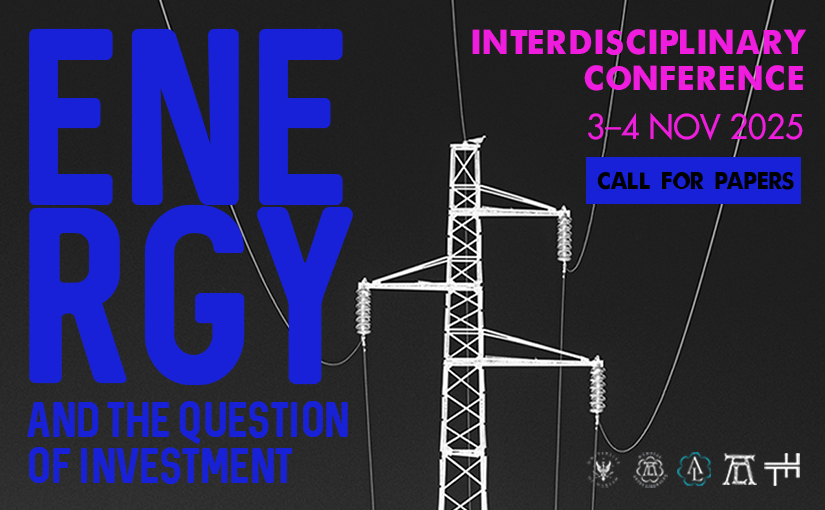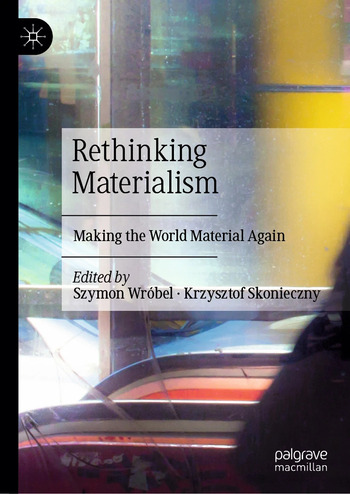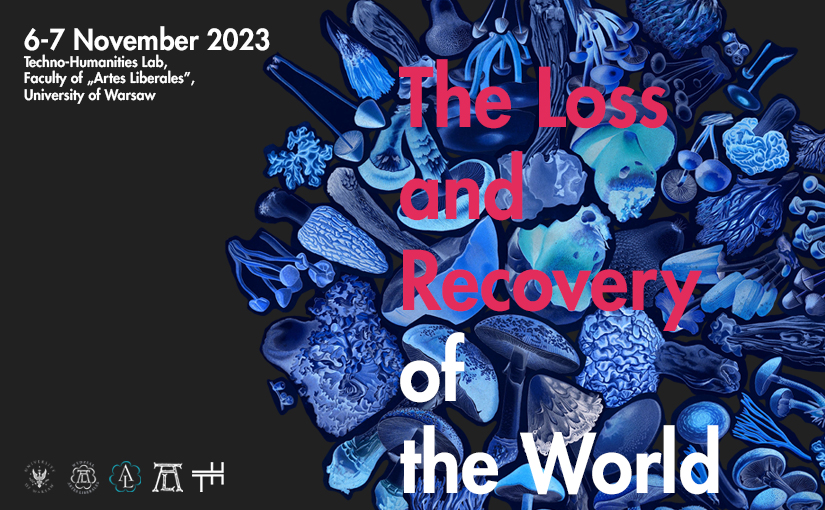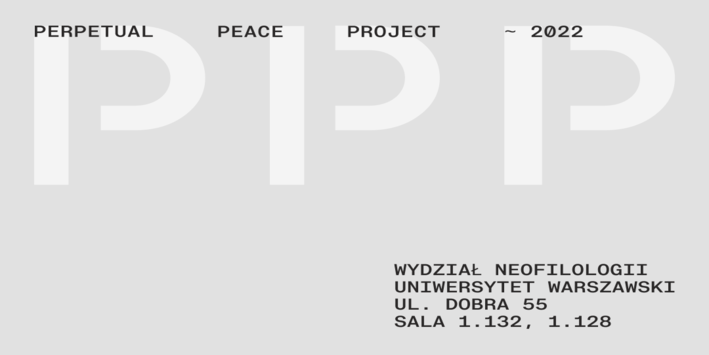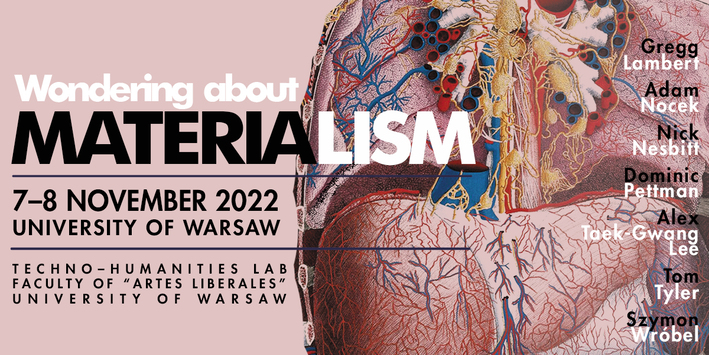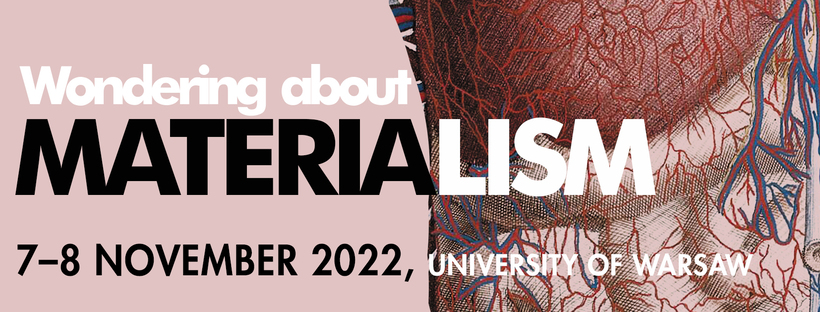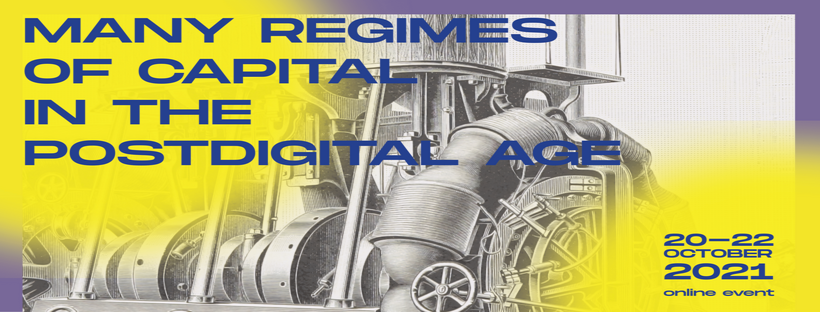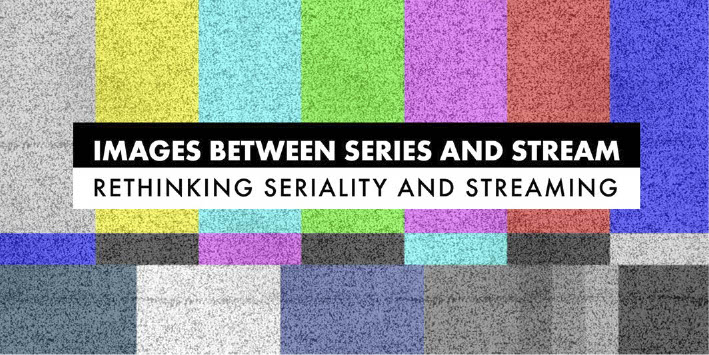Rozstrojeni. Theodor W. Adorno o muzyce w zarządzanym świecie – najnowsza książka Szymona Wróbla z Laboratorium Techno-Humanistyki UW • Techno-Humanities Lab UW ukazała się w serii Nowa Humanistyka nakładem Wydawnictwa IBL.
Publikacja została sfinansowana ze środków Uniwersytetu Warszawskiego oraz Fundacji „Instytut Artes Liberales”
Książka jest dostępna na stronie wydawnictwa.
Kategoria: Bez kategorii
CFP Deadline Extended!
The deadline for submitting abstracts to Energy and the Question of Investment conference has been extended. The new deadline is September 30.
All details and the full Call for Papers can be found on website of Technology and Socialization project:
https://technologyandsocialization.al.uw.edu.pl/
New book: Rethinking Materialism. Making the World Material Again
We are proud to announce that „Rethinking Materialism” has arrived!
The volume contains papers by: Joanna Bednarek, Maciej Bednarski, Paweł Dybel, Gabriela Filipowicz, Rodrigo Gonsalves, Daniel S. Mayor Fabre, Gregg Lambert, Alex Taek-Gwang Lee, Adam Lipszyc, Mirosław Loba, Mira Marcinów, Michał Paweł Markowski, Zoja Morochojewa, Denis Petrina, Monika Rogowska-Stangret, Krzysztof Skonieczny, Adrian Sobolewski-Kiwerski, Katarzyna Szafranowska, Piotr Wesołowski, Szymon Wróbel, Tetiana Zaiats, Oksana Dyakonenko, and Olena Sova.
Meticulously edited by Szymon Wróbel and Krzysztof Skonieczny.
„Rethinking Materialism” examines how events like the pandemic, ecological crisis, and volatile international situation have made our relationship to the world problematic, exploring new ways to theorize this condition.
CFP: Energy and the Question of Investment
Papers and panels are invited to the interdisciplinary conference “Energy and the Question of Investment”, which will take place in Warsaw from 3-4 November 2025. The conference, organized by the Faculty of “Artes Liberales” at the University of Warsaw (Poland), is part of the “Technology and Socialization” project directed by the Techno-Humanities Lab.
Georges Bataille’s ambitious and dark thesis suggests that the essence of society is not lack but excess and that this excess produces losses, whether of war or conspicuous consumption, which ensure their vitality. From this formula, which, according to Bataille, applies to the general economy, the idea of excess and waste is constantly worth thinking through and applied to the emotional and material economy. We seem to be on the threshold of the necessity of rethinking energy and its relationship to life at all levels. It is not just about, and we are not only asking about, the types of energy that are necessary for our life – fossil energy, oil, solar energy, renewable energy, but also our libidinal energy, which is necessary for all investments in life.
In thinking about the energies and future libidinal investments of man, we would like to bypass the simple hypotheses according to which death drive lies within the life drive and describe drive-based excess, the overflowing of the drives, as a true collective suicide, in which like lemmings who, pushing and shoving in large numbers, fall off the edge of cliffs, humanity itself is in the course of unconsciously rushing towards death. Certainly, capitalism has liberated what lies buried deep within it, and that moves it with all its energy: the death drive. We do not deny that capitalism is a particular moment in human history in which technics and science are perverted towards the over-productivity of labour. But we ask: do these statements about capitalism exhaust the spectrum of knowledge and analysis about the future of human energy and investment?
As striking as the analysis of contemporary capitalism may be, they are not convincing, for it confuses the accursed share analysed by Bataille with consumerist waste. Quite unlike the unbinding of the destructive drives by calculation, characteristic of unbridled capitalism, Bataille’s general economy affirms incalculability – where the surplus, instead of submitting to calculation in reinvestment, is sacrificed and not simply destroyed. We ask in this context: is man caught up in the morbid tendency of capitalism? What does it mean that he does not just accumulate wealth, but also, above all, negative goods, waste destroying more than he accumulates? Does all investment require abandoning immediate destruction and consumption and allowing deferred action and greater future consumption?
Max Weber argued in 1905 in The Protestant Ethic and the Spirit of Capitalism that “the impulse to acquisition, pursuit of gain, of money, of the greatest possible amount of money, has in itself nothing to do with capitalism”. According to Weber, capitalism may even be identical to restraint, or at least tempering, in this irrational impulse. “But capitalism – Weber wrote – is identical with the pursuit of profit, and forever renewed profit, by means of continuous, rational, capitalistic enterprise”. These claims seem to be seconded today by the words of Adrian Johnston, who claims that capitalism’s “infinite greed” demands that individuals sacrifice their pleasures, their well-being, and even themselves to serve in human capital. Johnston argues that in capitalism, we are all subject to the imperative to accumulate in perpetuity without limits and disregard all the consequences.
We intend to ask with particular care during the conference: what is an investment in general? On the one hand, we doubt that what Freud theorizes as investment, under the name of Besetzung (cathexis), consists simply of deferring to much greater future destruction, for it is the complete opposite. In fact, the difference in the satisfaction of the drives led Freud to introduce sublimation as a condition of all investment in an object of desire. On the other hand, we have reason to doubt that the libidinal economy of the drives is reducible to what economists present as an economic investment that more closely resembles speculation about the future than investment. For, in fact, it is highly debatable whether an investment is undertaken for the purpose of future destruction. In economics or Freudian theory, investment – as Besetzung – is, instead, undertaken in order to construct the future. Cathexis means the act of arresting, the act of retaining, of conserving, the act of intercepting or of containing.
As a result, we claim that any new critique of political economy should constitute a new economy, not of the morality of capitalism. For this, we should read Adam Smith’s The Theory of Moral Sentiments, along with Spinoza, Marx, Nietzsche and Freud, in the twenty-first-century context, that is, faced with what none of these authors could ever have known or even imagined. The political economy must be an economy of moral sentiments that includes Bataille’s general economy questions and Freud’s libidinal economy. As such, today’s capitalist economy is subject to a mortifying computational totalization that makes sublimation impossible, which it replaces by takeover bids and later by the short circuits to which the disruption strategies give rise. In such an energy-wasting economy, it becomes possible to accrue huge profits, but at the cost of destroying what they exploit, as surely as the barbarians who formerly invaded civilized territories would ruin them by plundering them.
Presentations are expected to last 20 to 30 minutes. Please send abstracts of up to 300 words, attached in a Word document, with a short bio to technologyandsocialization@gmail.com by 31 August 2025. Should you need any further information, do not hesitate to contact us at the same email address. All information about the conference and the “Technology and Socialization” project can be found here. We are looking forward to your participation and to hosting you in Warsaw.
Organizing Committee:
Professor Szymon Wróbel
Dr Krzysztof Skonieczny
Dr Katarzyna Szafranowska
Mgr Adam Cichoń
CFP: The Loss and Recovery of the World
Papers and panels are invited for the interdisciplinary conference, “The Loss and Recovery of the World”, which will take place in Warsaw from 6-7 November 2023. The conference is organized by the Faculty of Artes Liberales at the University of Warsaw (Poland) and is part of the „Technology and Socialization” project.
The pandemic took away our „right to” and „joy of” the world. In the short time of „closure in home”, man ceased to be a “worldly being” and became an „alone animal” re-domesticated and fully controlled by “algorithmic governmentality”. The world has become a problem, rather an “assumption” than a “reality”. The main question we would like to ask during the conference is if there’s a possibility of regaining the world and the joy derived from being in the world. Is the world still “something to live in”?
For a long time, philosophy talked about man who is “of the world” and spoke about the world which is “for man”. Regardless of whether our point of departure was Husserl’s phenomenology with the postulate that „every consciousness is the consciousness of something”, or Heidegger’s onto-theology postulating the primality of „being in the world”, or the philosophy of immanence that sees „consciousness already” in the world”. Even Alain Badiou‚s mathematical ontology studies, in its second phase, the possibility of the emergence of the world and its donations, or finally, a critical theory analyzing and following Karl Marx, the limits of commodity fetishism and the transformation of the world into a „department store” governed by the principle of generalized equivalence; well, regardless of these multiple strategies and starting points, „care for the world” remains crucial.
We ask: whether today’s philosophy is too easily reconciled with the idea of a world „without man” and „not for man”? Then, after the discussion about „things in themselves” (noumens) and „things for us ” (phenomena), we will discuss „things after man” and „freed from us”. Surely the world does better „without a man” than a man “without the world”. But does this mean, however, that philosophy in its “last step” is to become a philosophy of doom, a theory of extinction or „final disappearance”, i.e., generalized nihilism?
Was the “common world” only a particular illusion created by a small and privileged part of humanity, who wanted to justify the conquest of this world, or to reduce it to a mere „collection of variables”, or the collection of all things amenable to instrumental rationality? Has the world long been merely an energy and material resource called to reveal its as-yet-unseen treasures? Does modern set theory, refusing the concept of the set of all sets, not problematize the very concept of a “finite world” and the possibility of its closure? Is the world still to be recovered? And what kind of world would we like to regain?
At the beginning of the 20th century, György Lukács, in The Theory of the Novel, wrote – “Happy are those ages when the starry sky is the map of all possible paths-ages whose paths are illuminated by the light of the stars. Everything in such ages is new and yet familiar, full of adventure and yet their own. The world is wide and yet it is like a home, for the fire that burns in the soul is of the same essential nature as the stars; the world and the self, the light and the fire, are sharply distinct, yet they never become permanent strangers to one another, for fire is the soul of all light and all fire clothes itself in light” (Georg Lukács, The Theory of the Novel, trans. Anna Bostock, MIT Press, 1971, p. 29) Is the “happy world”, described by young Lukács, still conceivable and habitable? Is it „for us”, i.e., is it a „real possibility” for us – still “humane, all to humane”? Is the joy of „being in the world” possible at all? Or has the only possibility become „cosmic pessimism” condemning us to laments, elegies or hymns sung „after the loss of the earth”, and the only worldly mood (Stimmung) is „cosmic melancholy” as a reaction to the loss of the earth?
Presentations are expected to be between 20 and 30 minutes. Please send abstracts of up to 300 words, attached in a word document, with a short bio to technologyandsocialization@gmail.com by the 31st of August, 2023 24th of September, 2023. Should you need any further information, do not hesitate to contact us at the same e-mail address. All information related to the conference and the “Technology and Socialization” project can be found here. We are looking forward to your participation and to hosting you in Warsaw.
Organizing Committee:
Professor Szymon Wróbel
Dr Krzysztof Skonieczny
Dr Katarzyna Szafranowska
Mgr Adam Cichoń
Perpetual Peace Project
We are delighted to invite you to the conference Perpetual Peace Project which will take place in Warsaw, 9th November 2022.
The Perpetual Peace Project has never been a traditional acade-
mic philosophical debate about, for or against, Kant’s political philosophy. Instead, over the past fourteen years and three major international curatorial initiatives, we have employed the preliminary and definitive articles from Kant’s 1795 treatise Toward Perpetual Peace (Zum ewigen Frieden) to stage several major interventions between philosophers, diplomats, and artists to challenge our institutional knowledges around the idea of peace. Consequently, the firstprinciple of the 2008 initiative with the United Nations was: “The Perpetual Peace Project is predicated on the belief that no one institution or individual can clearly claim or guarantee a mastery of the concept of peace” (See Principles). Because the first event in this new phase, reinstated to address the idea of perpetual peace in the immediate context of the war in the Ukraine, is a gathering of mostly academic philosophers and theorists, we have asked our main speakers today to respond to the following provocation:
If, as Deleuze says, philosophy and only philosophy can lay claim to concepts, can philosophy today lay any claim to the concept of peace? Or has this concept or idea been relegated to what Foucault described as the “military-diplomatic apparatus” (dispositif) that belongs to the biopolitical mechanisms of “security”? Moreover, given the fact that most of the disciplinary and technical knowledges that deal with issues of global and regional security do not belong to academic philosophy, but are mostly located within the periphery of the state apparatus itself, the question of contemporary philosophy’s relation to idea of “perpetual peace” needs to be re-examined, especially in light of the war in Ukraine.
Click here to view the conference program
Wondering about Materialism
The fifth event of the Technology and Socialization Project — the conference Wondering about Materialism will take place in Warsaw, 7-8 November 2022.
The question – what is materialism today? – seems to be extremely important because we do not have any uniform concept of matter and we do not have a uniform concept of materialism. During the conference, the question about matter will be asked from three perspectives. First, from a historical perspective, we ask: what does it mean to be a “historical materialist”? Is historical materialism possible at all? Perhaps historical materialism is doomed to an alternative: it is either materialism or historicism? What does it mean that “matter” has historical form? Second, what is the relation between matter and information? The physicist John Archibald Wheeler proposed the radical it from bit (all from bit) hypothesis, according to which information underlies all matter, and every “it,” that is, every particle or energy field, is an organization of differences and therefore information. Are we ready to accept this hypothesis? Finally, we ask about the subject in the world of “intelligent matter”. What does it mean that matter is capable for self-organization? What does it mean to be a subject in the word of intelligent matter?
We hope to find answers to these and similar questions or at least clarify them during this conference.
Confirmed keynote speakers included Gregg Lambert, Adam J. Nocek, Nick Nesbitt, Dominic Pettman, Alex Taek-Gwang Lee, Tom Tyler
Click here to view the conference program, call for papers and information about the organisers.
The conference is organized by the Faculty of “Artes Liberales” at the University of Warsaw (Poland) in collaboration with the Center for Philosophical Technologies at Arizona State University.
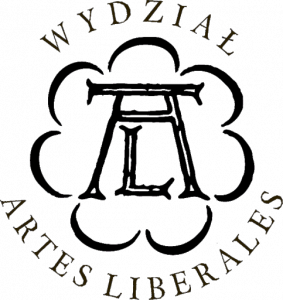
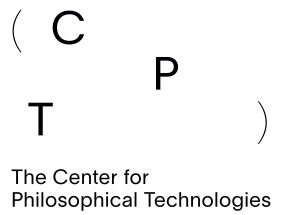
CFP: Wondering about Materialism
Papers and panels are invited for an interdisciplinary conference ‘Wondering about Materialism’, which will take place in Warsaw, 7-8 November 2022. The conference is organized by the Faculty of Artes Liberales at the University of Warsaw (Poland) and is a part of the project Technology and Socialization.
The question – what is materialism today? – seems to be extremely important because we do not have any uniform concept of matter and we do not have a uniform concept of materialism. During the conference, the question about matter will be asked from three perspectives. First, from a historical perspective, we ask: what does it mean to be a “historical materialist”? Is historical materialism possible at all? Perhaps historical materialism is doomed to an alternative: it is either materialism or historicism? What does it mean that “matter” has historical form? Second, what is the relation between matter and information? The physicist John Archibald Wheeler proposed the radical it from bit (all from bit) hypothesis, according to which information underlies all matter, and every „it,” that is, every particle or energy field, is an organization of differences and therefore information. Are we ready to accept this hypothesis? Finally, we ask about the subject in the world of “intelligent matter”. What does it mean that matter is capable for self-organization? What does it mean to be a subject in the word of intelligent matter?
We hope to find answers to these and similar questions or at least clarify them during this conference.
Proposals are welcome on, but not limited to, the following topics:
– Recent constellations of materialist – actor-network theory, new materialisms, speculative realism, and object-oriented ontology – have begun to call into question the continued relevance of cultural materialism. However, is the difference between cultural materialism (holds that subjects are by-products of their respective cultural milieus) and new materialism (emphasizing the moment of being entangled in strictly material conditions of action) politically well-motivated and intellectually credible?
– New materialists understand matter as possessing its own modes of self-transformation and self-organization, which means that matter is no longer a passive, opaque entity but is recognized as constantly forming and reforming in unexpected ways. We most often formulate this diagnosis in the form of the statement that „matter becomes” rather than „matter is”. But what does this mean? And what kind of interpretation should be given to this statement about the becoming of matter?
– If we accept that cultural materialism is an „anti-realist” position (constructivism), the question is: what kind of realism does the new materialism offer us? We would like to rethink the problem of the relationship between materialism and realism. Does being a materialist imply a realistic obligation regarding the existence of objects independent of the will and consciousness of the knowing subject?
– Prior to Kant one of the principal problems of philosophy was to think “substance”, following Kant philosophy has primarily consisted of trying to think “subject”. We ask the question: is the task of philosophy today to link “substance” and “subject”, i.e. to empower substance (Hegel), but also to desubstantialise the subject (Freud)? What is the place of the subject in the new materialism?
– Slavoj Žižek reading Hegel claims that, from the dialectical materialist standpoint, the true formula of materialism is that “material reality is non-all”. But what does it mean? Does it mean not only accepting the incoherent vision of reality, but also the reality which in some sense is always unfinished?
– What kind of materialism do we need? Do we need very consistent, rough, radical materialism without ideas, without rest, but full of fear of mystification, occultism, fear of falling into immaterialism, as it “principle enemy”. Or do we need materialism corrected by something that constantly eludes it, materialism that is uncertain of its status, uncertain of multiple types of being, allowing many forms of being, materialism ready to write such entities into the register of existence?
Presentations are expected to be between 20 and 30 minutes.
Please send abstracts of up to 300 words, attached in a word-document,
with a short bio, to technologyandsocialization@gmail.com by 31 August 2022.
Should you need any further information, do not hesitate to contact us at the same e-mail address. All information related to the conference and the Technology and Socialization project and can be found here. We are looking forward to your participation and to hosting you in Warsaw.
Organizing Committee:
Professor Szymon Wróbel
Dr Krzysztof Skonieczny
Dr Katarzyna Szafranowska
Mgr Adam Cichoń
Many Regimes of the Capital in the Postdigital Age
The fourth event of the Technology and Socialization Project — the conference Many Regimes of the Capital in the Postdigital Age will be held online from 20 to 22 October 2021.
The starting point of the conference was a fact that capitalism today is gaining new meaning and looking for a new name, new theorethical and practical approaches: from cognitive, affective, and neoliberal capitalism to computational, surveillance, necro-, and anarcho-capitalism. These are just several of the ways to name an era marked by the capitalization of nearly everything—work, attention, affect, and even life itself. This conference wishes to address not only the varieties of capitalist production today but also whether and to what extent the different manifestations of capitalism are only different types of capital. In other words, is mental and emotional health a commodity in the same sense as the products of our hands and brains are commodities? Does capital therefore have an essence with many different appearances? And if capitalism does have an essence, then is it reducible to the permanent expansion of economic transactions to every domain of human and nonhuman activity? We hope to find answers to these and similar questions during this conference.
Here you could view the conference program, book of abstracts, call for papers and information about the organisers.
CFP: Images Between Series and Stream – Rethinking Seriality and Streaming
The Techno-Humanities Lab and The Film Lab are delighted to invite you to the Interdisciplinary Conference “Images Between Series and Stream – Rethinking Seriality and Streaming” which will take place on 18-19 November 2021. Conference will be held online.
Confirmed keynote speakers include:
ADAM NOCEK (Professor in the School of Arts, Media, and Engineering and the Design School, Arizona State University) ALEX TAEK-GWANG LEE (Professor of British and American Cultural Studies, Kyung Hee University) ADAM LIPSZYC (Professor of Philosophy in the Insitute of Philosophy and Sociology, Polish Academy of Science) JAKUB MOMRO (Professor at the Department of Polish Studies, Jagiellonian University)
CALL FOR PAPERS
In the last few years watching TV series has become a distinct socio-cultural phenomenon. The increasing rise of streaming media services has profoundly changed the accessibility standards of TV series but also the way of watching them. However, the domestication of our life in pandemic, made us realize that streaming series and films should become more important objects of our interest than ever before. In some sense, we live in-series and on-stream platforms. New technological situations, such as the presence of videoconferences in our life, presents us not only with new problems but a new reorganisation of sensibile as Jacques Ranciere might say. Video-technology enters into our private sphere and in some sense it calls us to be constantly available – to be on-stream but also to live in series of accessibilities. The re-organisation of our life is obvious, but the role of images in this “re-” or “de-” organisation still requires some reflection. We are in constant tension between being-in-series and being-on-stream. We perceive ourselves as moving-images on screen. It affects our relationships and our perception. The collaboration of the Techno-Humanities Lab and Film Lab encourages us to ask questions on two different planesphilosophical and cinematic one. Thus, we ask what happens with the pieces of the film art when they become just “tiles” on a streaming platform — a series of „bricks in the wall”? But also – what happens with us when we become just tiles on video conference meetings?
We want to rethink seriality and streaming not only as certain phenomenon, but also as a notion itself We should look at them from a slightly wider perspective. All doubts lead us to the question “what do series do”? In particular, philosophers and culture researchers have paid attention to this problem and seriality itself. Umberto Eco classified the series as a kind of repetition which responds to our infantile need of always hearing the same story and being consoled by the “return of the Identical”. Other approaches were offered by Deleuze (quite opposite to Eco) and Sartre who tried to rethink series as a mode of our everyday life and experience. This encourages us to discuss the issue of seriality also from a more philosophical perspective. But what about streaming? How is it connected with seriality? How does it affect our perception? What changes in our lives and work?
Consequently, what doseries and streaming mean? How do they work? How do they shape our life, habitual processes and behavior? How do they change our thinking and orient us toward objects such as works of art? Last but not least – what does it mean to be inside of the series or what does it mean to be outside of the series? What does it mean to be between series and streaming?
Proposals are welcome, but not limited to the following topics:
-
What do series do? How are series changing our thinking? How are they shaping our everyday experience and habitual processes?
-
How does the streaming technique affect our life? Does video-technology become an evocative object (Sherry Turkle’s notion)? How does usage of video-technology for communication affect our relationships? What happens when video-technology enters into our private sphere?
-
Seriality of time or time of the series – what does it mean that somebody is in this or in another season of the given show? What does it mean to be in series or be outside of it? Or on-stream and off-stream? Are these different modes of being or different experiences of time? How do we experience time in the series?
-
How does streaming platforms and video conferences affect the process of filmmaking? New conceptions of montage, movies made through video conference platforms, usage of “tiles” in movies etc.
-
Presence of seriality in cinema – directors who made different movies about the same characters (e.g. Michael Haneke) but also movie directors who directed TV series (David Lynch and Twin Peaks). What is the difference between making series and making a movie? Are these two completely different types of perception or two types of thinking? How is thinking through series present in cinema?
-
Does popularity of TV series and stream platforms lead to the end of cinema? What is the difference between watching a movie in cinema and watching the same movie on a streaming platform? How does it change our perception of images?
-
“Videoconference fatigue”. How did usage of video-technology changed our work, our thinking and everyday experience? Is it not pushing us to our limits and to being in a constant arousal?
-
How are series and streaming media services changing the cinema? Does it mean that phenomena such as cinematographic art canon or cinephilia are disappearing?
-
Subjectivity of the experience of time in series’ viewers: binge watching, commute watching, repeated viewings, communal watching, instant reactions to episodes in the social media.
Presentations are expected to be between 20 and 30 minutes long.
Please send abstracts of max 300 words, attached in a word-document, with a short bio, to technologyandsocialization@gmail.com by 26 September 2021.
Should you need any further information, do not hesitate to contact us at the same email address. Allinformation related to the conference can be found at th.al.uw.edu.pl
The Organizing Committee,
Professor Szymon Wróbel
Dr Michał Oleszczyk
Dr Krzysztof Skonieczny
Dr Bolesław Racięski
Dr Katarzyna Szafranowska
Mgr Adam Cichoń


